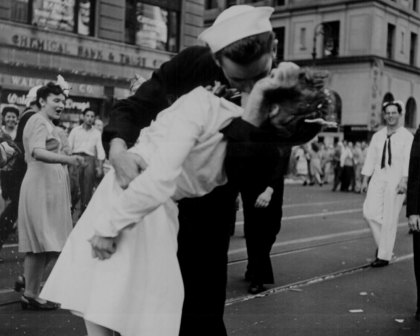Surrender of Japan ended war 70 years ago

New York City crowds celebrate. This iconic photo was taken by Lt. Victor Jorgensen, Aug. 14, 1945. Image: National Archives.
Japan surrendered Aug. 14, 1945, a week after atom bombs devastated Hiroshima and Nagasaki. At a 7 p.m. press conference that day, President Harry S. Truman announced that the war was over -- and the celebrations began.
Truman and his wife, Bess, walked out to the fountain on the White House grounds, The New York Times reported. A noisy celebration had begun, and the president made a “V” sign for the crowds.
The front cover of the Aug. 20, 1945, issue of Life magazine featured a photograph of Gen. Carl Andrew “Tooey” Spaatz of the Army Air Corps (later, the Air Force). Spaatz was in command of the U.S. Strategic Air Forces in the Pacific and oversaw the bombing of Japan -- including dropping the atom bomb. In the picture, Spaatz, sitting before a map of Asia, smoked a cigarette.
Inside, under the headline, “Victory reports around the world,” a correspondent in London reported: “A conga line of American and British soldiers wound slowly down Regent Street to Piccadilly Circus. … Two Chinese soldiers were plucked from their car by GIs and carried shoulder high into the Regent Palace Hotel, where a one-legged British officer used his crutch to conduct a throng of Americans singing ‘God Save the King.’”
In major cities on both sides of the Atlantic, crowds celebrated. More than 400,000 American soldiers, sailors, marines, airmen and other military personnel had been killed or remained missing in action during the war, according to the National Park Service World War II Memorial. But now, the surviving service members would come home. Even so, an undercurrent of dread accompanied the celebration, for the atom bomb had changed the world.
By 1949, four years after Hiroshima and Nagasaki, the Soviet Union detonated its own bomb. Children growing up in the 1950s learned “duck and cover” drills to prepare them for a nuclear attack. And in 1953, Ethel and Julius Rosenberg were executed for conspiracy to commit espionage in connection with accusations that both were involved in passing nuclear secrets to the Soviets.
“The thing for us to fear today is not the atom, but the nature of man, lest he lose either his conscience or his humility before the inherent mystery of things,” the 1945 Life magazine editorial read. “… No limits are set to our Promethean ingenuity, provided that we remember that we are not Jove. We are not ants, either; we can abolish warfare, and mitigate man’s inhumanity to man. But all this will take some doing. And we are in a strange new land.”
Sources:
- The New York Times: Japan Surrenders! Emperor Accepts Allied Rule.
- Life Magazine, Aug. 20, 1945 (Google Books).
- National Park Service: World War II Memorial (number of American servicemen dead during World War II).
- The American Presidency Project, University of California, Santa Barbara: President Harry Truman, the president's news conference, Aug. 14, 1945.
- Smithsonian Magazine: Spies who spilled atomic bomb Secrets.
- The Cold War Museum: Soviet Atomic Bomb Test.
Related:
70 years ago: Atom bomb dropped on Japan
Four phrases associated with the Cold War
Testimony sheds light on Rosenberg case
If you would like to comment, contact StudyHall.Rocks or like us on Facebook and tell us what you think.

